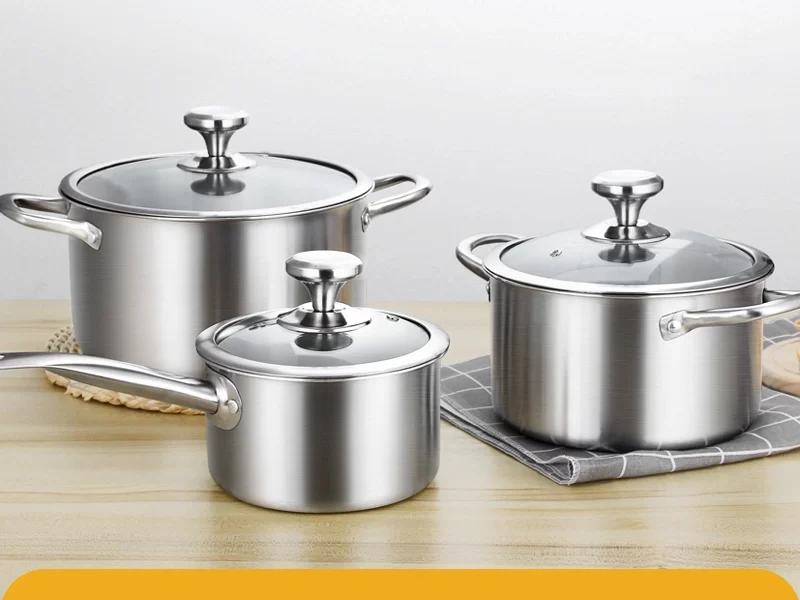
Faced with a wide range of cookware products on the market, many people are often confused by concepts such as “multi-layer structure” and “high-grade materials”, but it is difficult to distinguish the true from the false. For purchasers, kitchenware brands or catering equipment suppliers, how quickly determine whether the pots are genuine is directly related to customer satisfaction and brand reputation. This article will teach you how to identify high-quality tri-ply stainless steel cookware and make the right purchasing decisions.
What is the real value of the tri-ply structure?
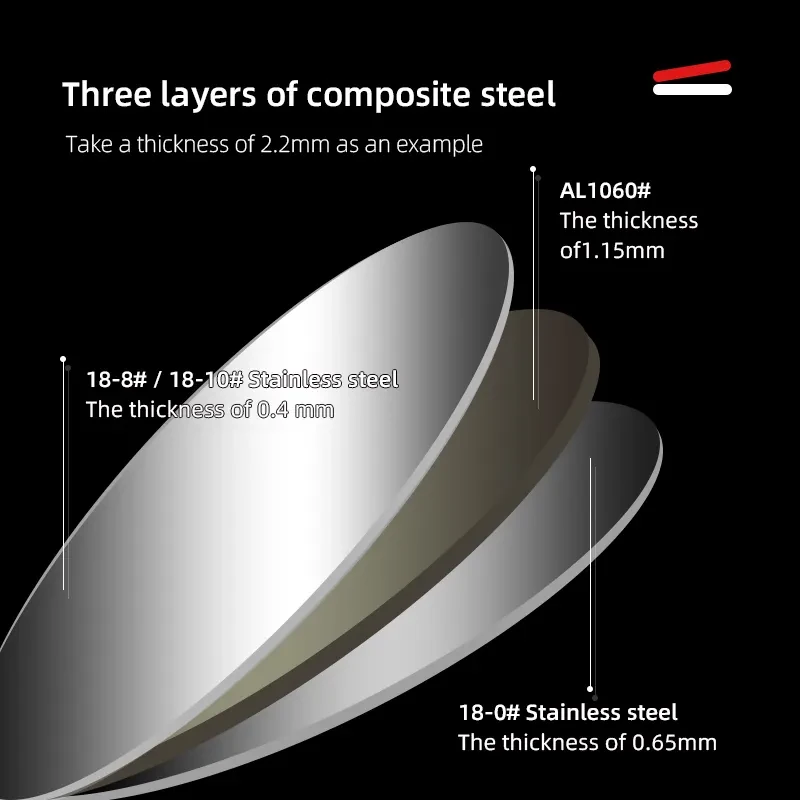
Real tri-ply stainless steel cookware (also known as coated, composite bottom) is composed of three layers; the structure is as follows:
Inner layer: food-grade stainless steel (commonly 304 or 316L)
Direct contact with food, which is safe, corrosion-resistant, and does not easily leave odor and color.
Middle layer: high thermal conductivity metal (aluminum or copper)
It is the thermal core, which can quickly and evenly transfer heat to the entire bottom of the cookware to avoid local high temperatures or sticking the cookware.
Outer layer: magnetized stainless steel (usually 430 stainless steel)
Strong and resistant to ablation, suitable for induction cookers, and has good anti-rust performance.
Why is the tri-ply structure worth choosing?
Tri-ply stainless steel cookware has achieved an ideal balance between thermal conductivity, cost-effectiveness and durability. Compared with:
- Single-layer stainless steel cookware: slow and uneven heat conduction, easy to burn.
- Pure aluminum cookware: fast heat conduction but easy to oxidize, acid etch, and precipitate metal.
- Five-layer cookware: Although there are more layers, the core heat conduction still relies on the middle aluminum layer. The additional surface layer mainly increases the cost, and the performance improvement is limited.
Practical tips for identifying high-quality tri-ply stainless steel cookware
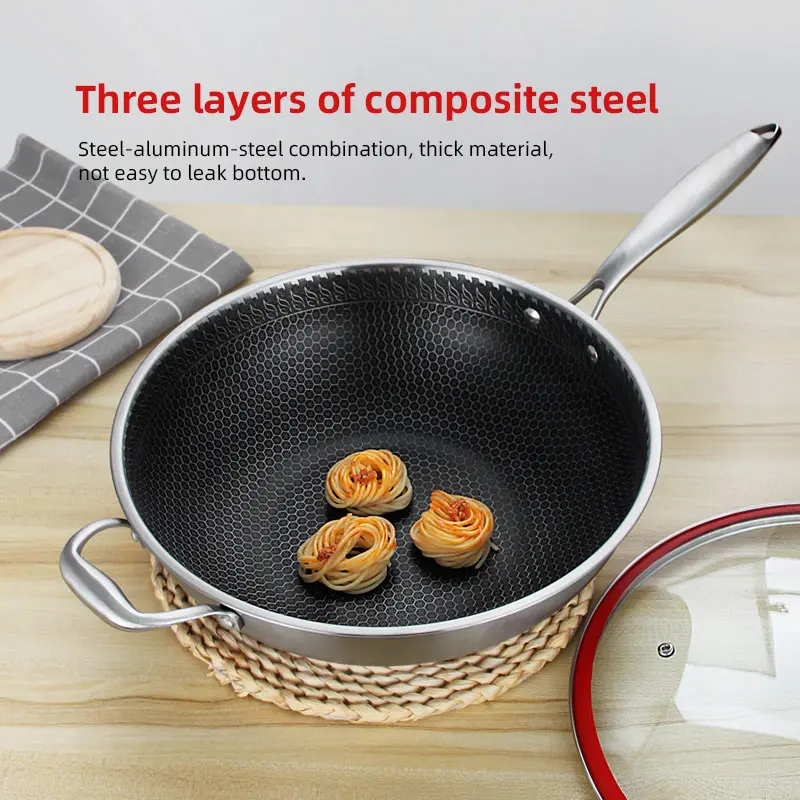
Compare weight
The high-quality tri-ply cookware bottom is thick and contains a dense aluminum core or a thick copper core. It feels heavy when you weigh it.
Comparison method: If the cookware of the same size seems light, it may be just a “pseudo-tri-ply” on the surface, and the middle heat conduction layer is extremely thin or even missing.
Look at the cookware’s bottom edge
The premium tri-ply structure cookware bottom is flat and has clear layers and a fine pressing process.
Identification points: Those with fuzzy structure, rough edges, or a sense of layer dislocation are often low-quality products with rough processing.
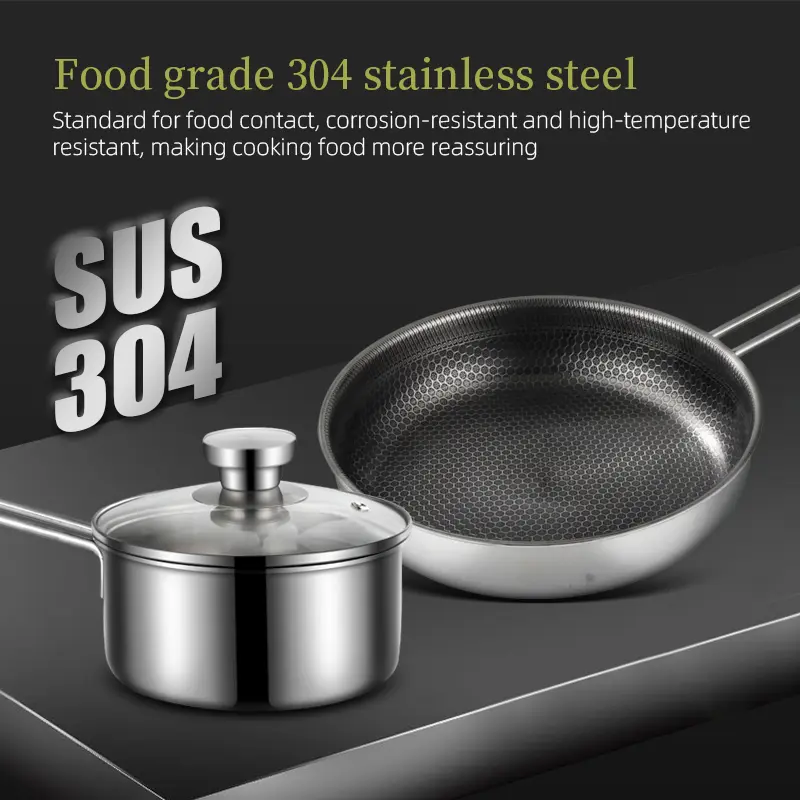
Check the material identification
The inner wall or bottom of the cookware should usually have a laser-engraved stainless steel type identification. Such as “304”, “316/L”, etc. Notes:
- Although “18/8” is also one of the identification methods for 304 steel, it is not as accurate and reliable as direct identification.
- No identification or only “high-grade stainless steel” is often a quality disaster area
Test with a magnet
Attach a magnet to the cookware bottom, and the magnetic layer of a top-grade tri-ply stainless steel cookware should be adsorbed.
Test logic: The true tri-ply stainless steel cookware bottom uses 430 magnetic stainless steel, and the magnet should be firmly adhered. If it is completely non-magnetic, it may use low-priced 201 stainless steel or a pseudo-tri-ply structure.
Demonstration of uniform heat conduction (testing method in-store)
Drop a small amount of water or oil into the bottom of the cookware, heat it and observe the heating reaction.
- Real cookware performance: water drops roll evenly, and the oil temperature rises at the same time.
- Fake cookware signal: the center of the cookware smokes first, and the edge does not react for a long time, indicating that the heat conduction distribution is uneven.
Look at the workmanship details
- Rivet connection: high-quality pots use solid 304 rivets, the handle is stable and not loose, and the seams are smooth and burr-free.
- Cookware cover design: Thick, tightly sealed cookware covers can better retain heat; the edge has a guide groove design to prevent overflow.
Beware of stainless steel cookware traps
Are five layers better than three layers?
Not necessarily. Most five-layer pots are based on a tri-ply structure with two layers of steel skin, which does not substantially improve the heat conduction efficiency, but increases the cost.
Decorative surface treatment
Diamond patterns, brushed surfaces, embossed patterns, etc., are mostly used for aesthetic decoration and have little to do with performance. The key lies in the material and structure, and there is no need to pay a premium for the appearance.
The halo of “German design / Italian craftsmanship”
Brand propaganda often boasts “European origin”, but the real quality depends on the production factory, materials and process certification. The small print is the key.
No brand or copycat brand
This type of cookware has no logo on the material, no guarantee on the structure, and no safety standards. It is more secure to choose a brand with formal testing and certification (such as LFGB, FDA).
Why is high-quality tri-ply stainless steel cookware worth investing in?
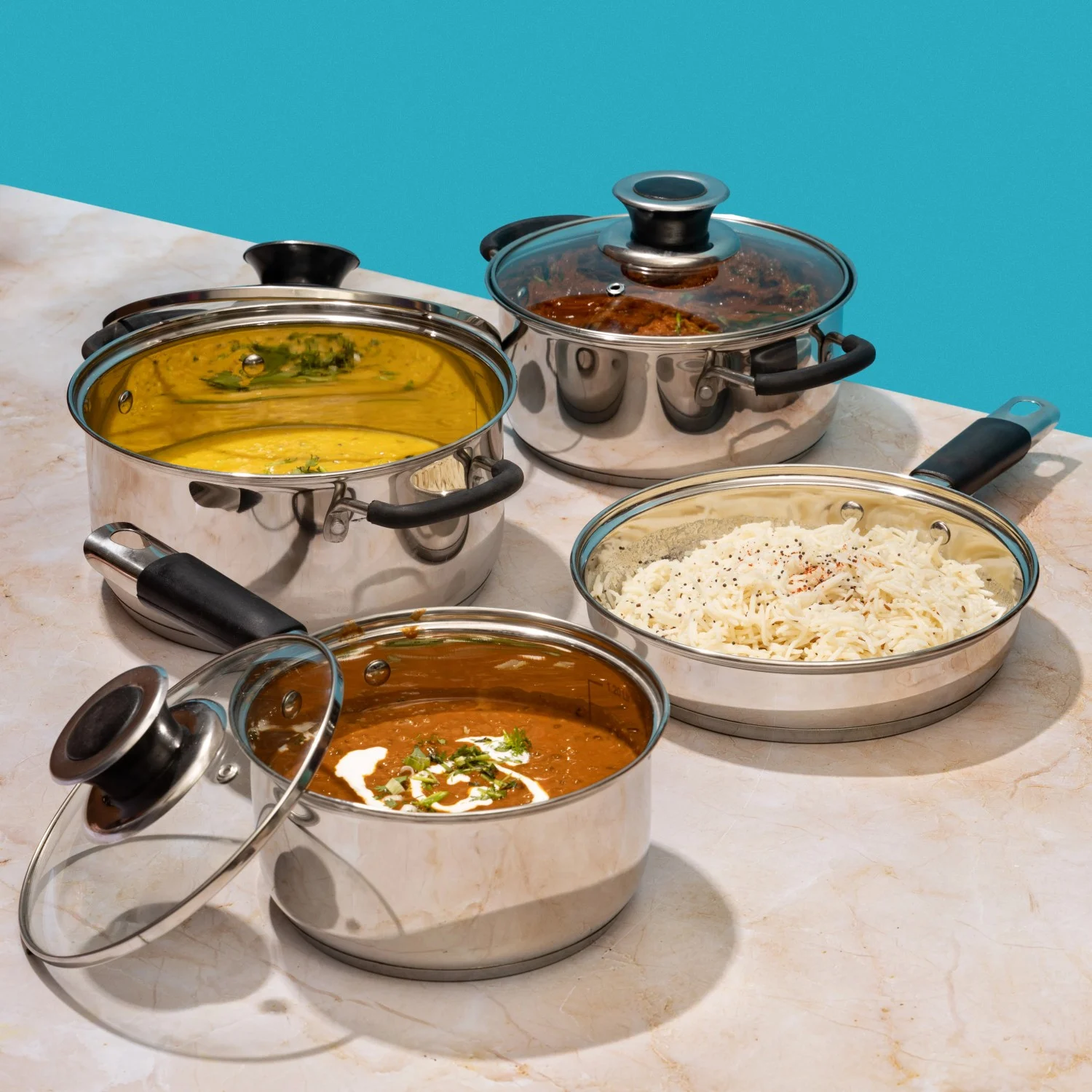
- Avoid sticking to the bottom of the cookware: the aluminum core conducts heat evenly and reduces local high temperatures.
- Energy saving and time saving: fast heating, good insulation, saving gas and electricity.
- Health and safety: food-grade 304/316L steel to avoid heavy metal leakage.
- Long service life: wear-resistant and corrosion-resistant, normal use can reach more than 10 years.
- Suitable for all stoves: the magnetic bottom is compatible with gas stoves, induction cookers, electric ceramic stoves, etc.
Conclusion: Buying cookware is not difficult; there are ways to identify top-quality cookware
Next time you enter the kitchenware market, please remember these four sentences:
- Weigh the weight: only real materials have weight
- Identify the structure: only clear layers are true tri-ply
- Measure magnetic force: the magnetic bottom is suitable for more stoves
- Identify the material: 304/316L is a health guarantee
Choosing a real tri-ply stainless steel cookware is not only the beginning of kitchen upgrades but an investment in the quality of life.
Hengguang high-quality tri-ply stainless steel cookware
As a leading kitchenware manufacturer, Hengguang focuses on creating tri-ply stainless steel cookware with a reasonable structure and superior performance. We use 304/316L food-grade stainless steel and high-purity aluminum core pressing technology, pass international quality inspections, and take into account thermal conductivity, safety, health and durability. Welcome to contact us to obtain product manuals or customized quotes.